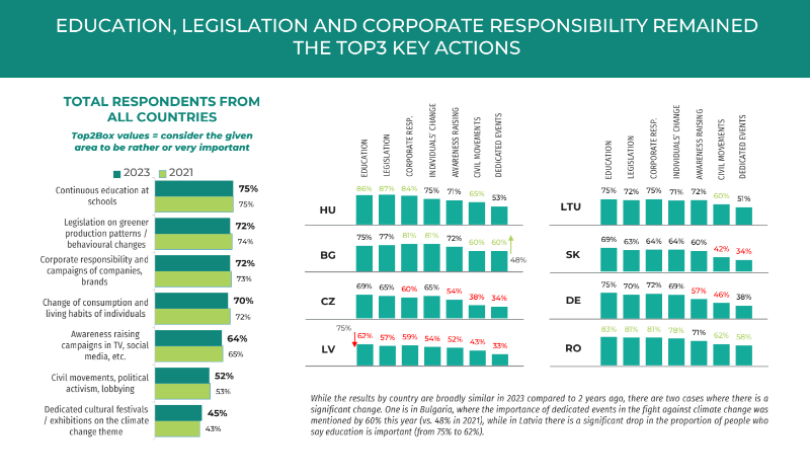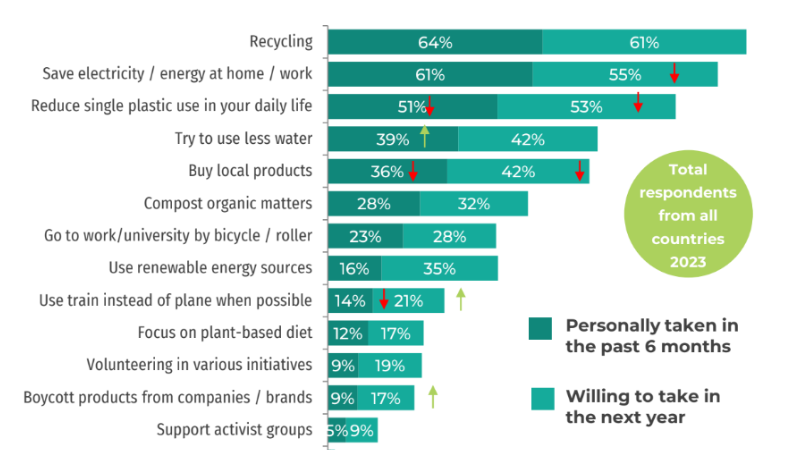This is always the top question when we talk about climate changes.Climate change is happening now, and it’s the most serious threat to life on our planet. The average global temperature is today 0.95 to 1.20 °C higher than at the end of the 19th century. Scientists consider an increase of 2°C compared to pre-industrialised levels as a threshold with dangerous and catastrophic consequences for climate and the environment. We all have seen the devastating wildfires this summer in Greece, Italy, and Spain, and suffered from the heatwaves. Fortunately, there are plenty of solutions to climate change, they are well-understood.That's why actions on any level of the society are urgent.
We planned to conduct a second survey in 2023 with the cooperation of CEEWeb, our lead partner organization, focusing on how climate change impacts all life on Earth and how our choices affect the ecosystems in order to capitalize on the strong synergies in an emotional, life-centered communication campaign. The evaluation of the survey was compared with the results of the 2021 survey to see how the understanding of the public, and especially the young (18-35 years old) generation, has changed after about one and a half years. The aim of the ‘Game Over?’ project is to support the multi-dimensional and cross-country campaign of CEEWEb for Biodiversity with identifying the most appropriate messages and channels for communication actions.
What actions are we taking in 2023? How do we stop fossil fuel emissions?
To stop global warming, we’ll need to zero out greenhouse gas emissions from billions of different sources worldwide. In our survey we asked people what are the top actions against climate change? As a result, top key actions are: education, legislation and corporate responsibility ( including marketing, campaigns of brands), change of consumption and living habits, awareness campaigns in media, civil movements, political activism and lobbying,dedicated cultural festivals, conferences and events about climate change.
While the results by country are broadly similar in 2023 compared to 2 years ago, there are two cases where there is a significant change. One is in Bulgaria, where the importance of dedicated events in the fight against climate change was mentioned by 60% this year (vs. 48% in 2021), while in Latvia there is a significant drop in the proportion of people who say education is important (from 75% to 62%).

Is what I do important? That is the question everyone is asking
‘I still cycle a lot. I fight with my neighbors who throw litter next to the bin. I am reducing consumption...’ (LT, male, 37)
‘I try to avoid disposable plastic, use my own bags whenever possible, and recently I tried using washable sanitary pads...’ (CZ, female, 20)
‘Every family was given an extra selective trash bin...it is very good, everything is being transported from home, no need to use the selective island...and I have a compost bin in the backyard, too.’ (HU, male, 37)
‘I try to shop consciously, and to plan my shopping. I don't shop impulsively; I don't want to throw food away.” (RO, female, 35)
The majority of respondents reported that they have continued doing the same things as two years ago to protect the environment; mainly recycling was mentioned as activity, and as well as the area where most development and improvement was observed. In addition, avoiding disposable plastic, and energy saving (especially because of rising prices) were also frequently mentioned, followed by a long list of activities, such as buying used clothes, using electric bike or car, driving less and using public transport or walking instead, saving energy, reduced use of chemical ingredients, buying XL size or no packaging, growing fruits and vegetable/keeping chicken, minimizing consumption – and a few mentions of planting forests, signing petitions and cleaning, waste collecting campaigns were made.
Recycling and energy saving remain the two most popular personal actions to mitigate climate change.

Compared to the 2021 results, a significantly lower proportion of respondents mentioned reducing the usage of single plastic in their daily lives in 2023, but half of respondents still do so, whether in the recent past or in the future. In contrast, the use of less water was significantly more frequently mentioned this year, as was the boycotting of certain products, which is now the case for 1 in 10 respondents.
Although a third of respondents said they would use renewable energy in the near future in 2021, the proportion of those who have done so in the last six months has fallen below 20% again this year - but 35% are again optimistic about the future.
In terms of both past and future actions, Hungarians and Germans are more represented than average for most actions.
Preferences of the 18-35 y.o. age group (2023)
Young people are significantly less likely than average to say that they try to save energy (55%) and buy local products (30%), while they are much more likely to use alternative modes of transport (26%), and support activist groups (9%).
Barriers perceived to engaging with climate change
Besides some (still valid) aspects such as laziness, selfishness, sticking with old habits and passivity experiences from people surrounding responsible citizens, and lack of time and guidance – an increased level of discouragement, pessimism and overall lower motivation can be observed due to:
• Lack of interest and willingness to act by the government, politicians putting their own agenda and economic interest in the first place
• The negative financial and psychological impacts of the war, the current uncertain economic (recession, inflation) and political situation
• In some cases, due to changes in individual situation (e.g. buying a new house, birth of first child) respondents’ financial circumstances have become worse; students are especially vulnerable
• German respondents are especially pessimistic, hopeless and tired; they have the impression that climate activists are portrayed negatively in the media, and demonstrations have not had the desired outcome; also large companies are only addressed in the context of greenwashing
• In the Czech Republic, growing skepticism is observed regarding the power of international institutions, especially UN – as it is not able to stop the conflict in Ukraine
• In Hungary, lack of support from the government for alternative energy investments (solar panels, wind turbines) and for education were mentioned
• Lithuanian respondents are very anxious about their future and talk about the fragility of life.
- Why does the younger generation in 2023 feel disappointed, skeptical and pessimistic about climate change?
- How do women and men feel about climate change? Are there any differences between the genders?
- How big is the problem?
- Who is responsible?
- And how we can raise awareness and what is the role of the media?
Those are the questions we discuss further in our blog series.
If you want to know when the new blog article will be published, or get more news about the topic sign up to our newsletter here.
If you are interested in the whole survey, you can find it here.



